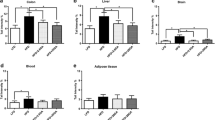Summary
Background
Fruit and vegetable consumption protects against cancer. This is attributed in part to antioxidants such as vitamin E combating oxidative DNA damage. Anthocyanins are found in significant concentrations in the human diet. However, it remains to be established whether they are bioactive in vivo.
Aim
To investigate the consequence both of vitamin E deficiency on oxidative damage to DNA and lipids and the cytoprotective effect of nutritionally relevant levels of cyanidin–3–glycoside both in vivo in rats and in vitro in human colonocytes.
Methods
Male Rowett Hooded Lister rats were fed a diet containing less than 0.5 mg/kg vitamin E or a vitamin E supplemented control diet containing 100 mg dα–tocopherol acetate/kg. Half of the controls and vitamin E–deficient rats received cyanidin–3–glycoside (100 mg/kg). After 12 weeks endogenous DNA stability in rat lymphocytes (strand breaks and oxidised bases) and response to oxidative stress ex vivo (H2O2; 200 µM) was measured by single cell gel electrophoresis (SCGE). Tissue levels of 8–oxo–7,8–dihydro–2’–deoxyguanosine (8–Oxo–dG) were measured by HPLC with EC detection. Dα–tocopherol and lipid peroxidation products (thiobarbituric acid reactive substances; TBARS) were measured by HPLC. Rat plasma pyruvate kinase and the production of reactive oxygen by phagocytes were detected spectrophotometrically and by flow cytometry respectively. Immortalised human colon epithelial cells (HCEC) were preincubated in vitro with the anthocyanins cyanidin and cyanidin–3–glycoside and the flavonol quercetin (all 50 µM) before exposure to H2O2 (200 µM). DNA damage was measured by SCGE as above.
Results
Plasma and liver dα–tocopherol declined progressively over 12 weeks in rats made vitamin E deficient. Lipid peroxidation was increased significantly in plasma, liver and red cells. Reactive oxygen levels in phagocytes and plasma pyruvate kinase were increased. Vitamin E deficiency did not affect DNA stability in rat lymphocytes, liver or colon. Cyanidin–3–glycoside did not alter lipid peroxidation or DNA damage in rats. However, it was chemoprotective against DNA damage in human colonocytes.DNA strand breakage was decreased 38.8 ± 2.2 % after pretreatment with anthocyanin.
Conclusion
while it is accepted that vitamin E alters lipid oxidation in vivo, its role in maintaining DNA stability remains unclear. Moreover, whereas cyanidin–3–glycoside protects against oxidative DNA damage in vitro, at nutritionally relevant concentrations it is ineffective against oxidative stress in vivo.
Similar content being viewed by others
Author information
Authors and Affiliations
Corresponding author
Rights and permissions
About this article
Cite this article
Duthie, S.J., Gardner, P.T., Morrice, P.C. et al. DNA stability and lipid peroxidation in vitamin E–deficient rats in vivo and colon cells in vitro . Eur J Nutr 44, 195–203 (2005). https://doi.org/10.1007/s00394-004-0511-1
Received:
Accepted:
Published:
Issue Date:
DOI: https://doi.org/10.1007/s00394-004-0511-1




